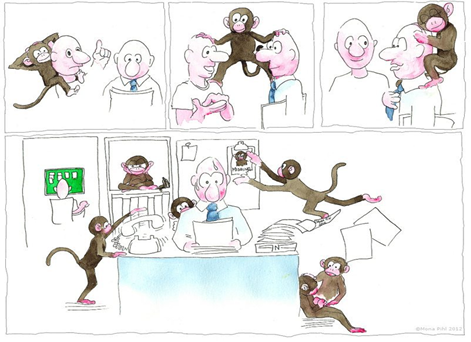Introduction
In the hustle and bustle of managerial life, time management and effective delegation often pose significant challenges. This article delves into these issues and proposes a solution: managing time more effectively.
Allied to this topic is a training workshop offered by Celtar Advisers on Delegation, available via coaching (one2one meetings) or for groups. This workshop focuses on making clear requests and understanding how responsibility for actions is passed from one person to another. Through experience, individuals often encounter situations where colleagues fail to take responsibility for tasks and actions.
Where’s the Monkey? Number One
Picture this: a manager is strolling down the hall when she encounters one of her team members, Sean Costello. As they exchange greetings, Sean dives into a problem, a familiar scenario for many managers. The manager realizes she knows enough to get involved but lacks the information to make an immediate decision. Eventually, she defers the issue, promising to follow up later.
This scenario highlights a common dynamic: the transfer of responsibility, or “the monkey,” from subordinate to manager. Once the monkey leaps, the manager becomes subordinate to their team member, assuming responsibility and committing to providing updates.
Where’s the Monkey? Number Two
Consider another scenario: after a meeting, a manager instructs a team member, Shane O’Donoghue, to send an email regarding a discussed topic. O’Donoghue promptly complies, but the next move rests with the manager. Delays on her part lead to frustration for the team member and a growing backlog of tasks for the manager.
Where’s the Monkey? Number Three
In another instance, a manager agrees to support a team member, Niamh O’Sullivan, with a project but fails to provide timely feedback. O’Sullivan’s progress stalls as she awaits the manager’s response, leading to inefficiency and bottlenecks.
Where’s the Monkey? Number Four
Lastly, a new team member, Niamh Halligan, awaits direction on a newly assigned project. Despite having the responsibility, she remains immobilized until the manager takes action.
In each case, the assumption of joint responsibility initiates a cycle where the manager becomes burdened with tasks that should rightfully belong to their team. Preventing this requires clear communication and proactive management.

Who is Working for Whom?
Suppose each team member limits the number of monkeys they pass to the manager. Despite their thoughtfulness, the manager ends up overwhelmed, juggling numerous tasks and struggling to make decisions. The result? Bottlenecks and frustration.
The manager’s inability to address these issues stems from being consumed by both imposed and system-driven tasks. Without discretionary time, they find themselves trapped in a cycle of inefficiency.
Getting Rid of Monkeys
Determined to reclaim control, the manager adopts a new approach. She meets with each team member, addressing their respective monkeys and devising strategies to transfer responsibility back to them. Through clear communication and mutual understanding, the monkeys gradually return to their rightful owners.
Transferring the Initiative
Managers can empower their team members by transferring initiative and responsibility to them. By doing so, they free up discretionary time and foster a culture of accountability within the team.
The Care and Feeding of Monkeys
To maintain this newfound efficiency, managers must adhere to certain principles. Monkeys should be addressed promptly, through face-to-face or telephone communication, and each should have a clear feeding schedule and level of initiative assigned to it.
In Conclusion
By implementing these strategies, managers can regain control of their time and empower their team members to take ownership of their tasks. Through effective delegation and proactive management, they can achieve greater productivity and efficiency in the workplace.
“Who’s Got The Monkey Now?” originated in the Harvard Business Review in an 1999 article, has been revised and shortened by Billy Linehan of Celtar Advisers [email protected]




